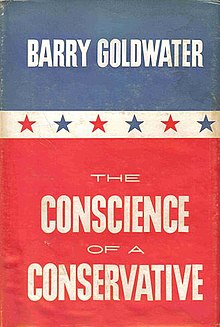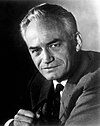 Cover of the first edition Cover of the first edition | |
| Author | Barry Goldwater (nominal) L. Brent Bozell Jr. (ghostwriter) |
|---|---|
| Subject | Politics, American conservatism |
| Publisher | Victor Publishing Co. |
| Publication date | 1960 |
| Media type | |
| Pages | 123 |
| OCLC | 1002492 |
The Conscience of a Conservative is a 1960 book published under the name of Arizona Senator Barry Goldwater who was the 1964 Republican presidential candidate. It helped revive the American conservative movement and make Goldwater a political star, and it has influenced countless conservatives in the United States, helping to lay the foundation for the Reagan Revolution of the 1980s.
The book was largely ghostwritten by L. Brent Bozell Jr., brother-in-law of William F. Buckley Jr. Bozell and Buckley had been members of Yale's debate team. They had co-authored the controversial book, McCarthy and His Enemies, in 1955. Bozell had been Goldwater's speechwriter in the 1950s and was familiar with many of his ideals.
Content
The 123-page book covers such topics as education, labor unions and policies, civil rights, agricultural policy and farm subsidies, social welfare programs, and income taxation. The book is considered to be a significant statement of politically and economically American conservative ideas which were to gain influence during the following decades.
In his book, Goldwater states explicitly that there are "laws of God" and "truths of God" which inform his concept of 'conservatism' and under which the US should operate.
Later editions
A half-century edition, edited by C.C. Goldwater (his granddaughter), with a foreword by George Will, and an afterword by Robert F. Kennedy Jr, was published by the Princeton University Press in 2007.
Namesake books
The book, and its title, continue to inspire contemporary political commentary.
- Mayer Schiller (1978), The (Guilty) Conscience of a Conservative
- In 2007, Paul Krugman entitled his own book The Conscience of a Liberal, saying in the introduction that he wanted his work to stand as a counterpoint to Goldwater's.
- Zell Miller (2003), A National Party No More: The Conscience of a Conservative Democrat
- Wayne Allyn Root (2009), The Conscience of a Libertarian: Empowering the Citizen Revolution with God, Guns, Gambling & Tax Cuts.
- Gary Chartier (2011), The Conscience of an Anarchist: Why It's Time to Say Good-Bye to the State and Build a Free Society
- Jeff Flake (2017), Conscience of a Conservative: A Rejection of Destructive Politics and a Return to Principle
- Steven Klees (2020), The Conscience of a Progressive
References
- ^ Frohnen, Bruce (2006). American Conservatism: An Encyclopedia. Wilmington: Intercollegiate Studies Institute. pp. 179–80. ISBN 1-932236-43-0.
- Hemmer, Nicole (2016). "Chapter 10: The Compromise". Messengers of the Right : conservative media and the transformation of American politics. Philadelphia. ISBN 978-0-8122-4839-5. OCLC 945028632.
{{cite book}}: CS1 maint: location missing publisher (link) - Goldwater, Barry (1960). The Conscience of a Conservative. Victor Publishing Co.
- Krugman, Paul (2007). The Conscience of a Liberal. New York: W.W. Norton & Co. ISBN 978-0-393-06069-0.
- Klees, Steven J. (2020). The conscience of a progressive. Winchester: Zero Books. ISBN 978-1-78904-496-6. OCLC 1202971078.
External links
- Full text: The Conscience of a Conservative
| Barry Goldwater | ||
|---|---|---|
| Political career |  | |
| Elections | ||
| Family |
| |
| Other | ||